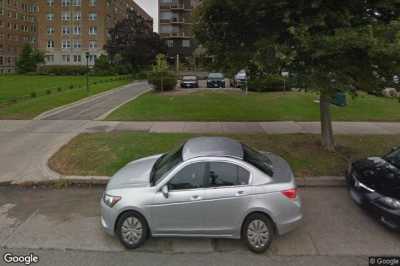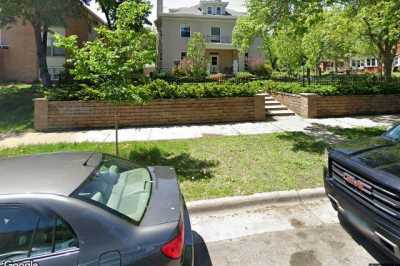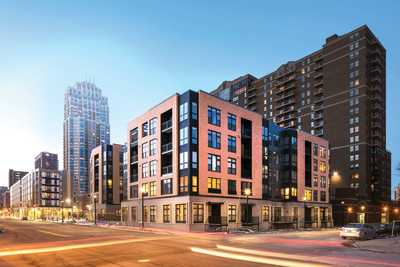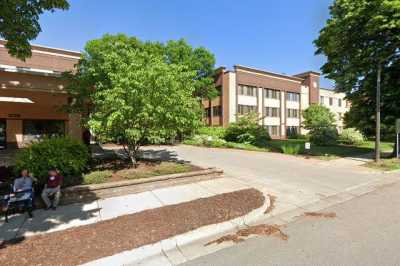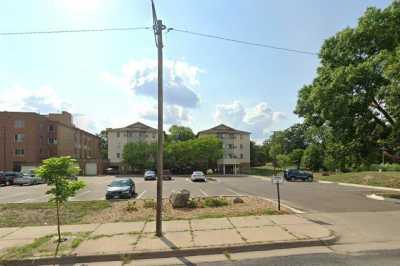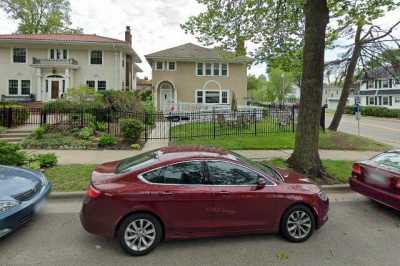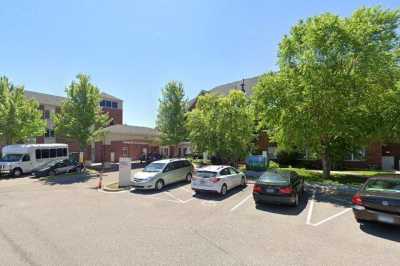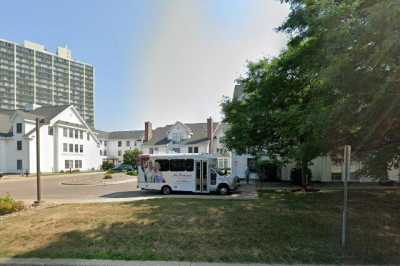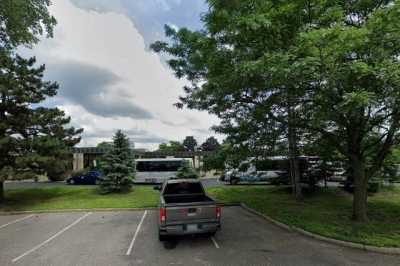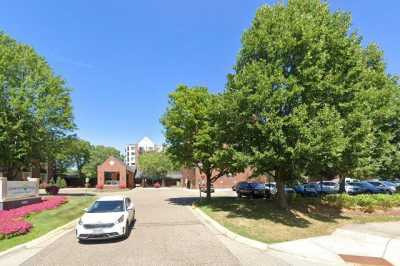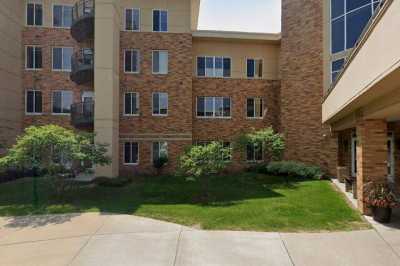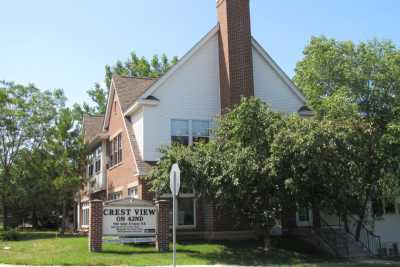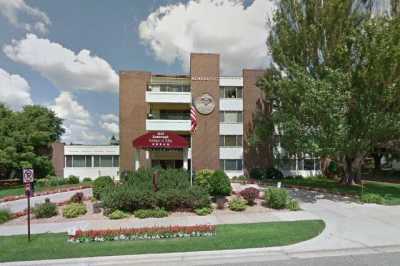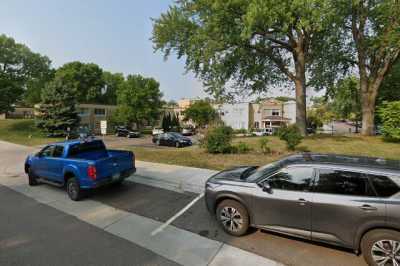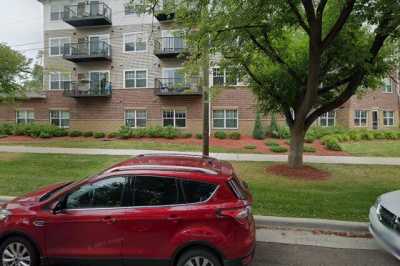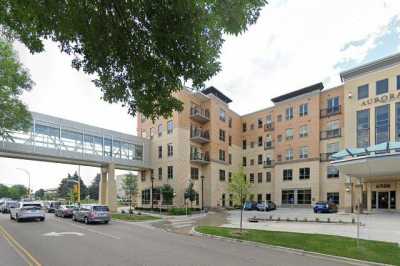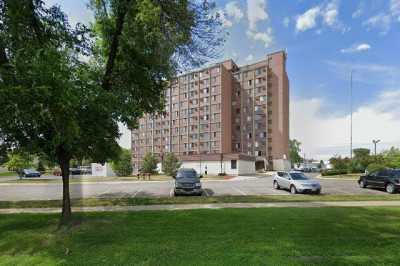
10 Best Memory Care Facilities in Minneapolis, MN
Minneapolis, a city known for high-quality health care, a vibrant arts scene, and a gorgeous lake-dotted landscape, is an ideal locale for families with loved ones who need care for Alzheimer’s disease or other forms of dementia. The Twin Cities create an environment that supports healthy minds and bodies.
Within a 10-mile radius of downtown Minneapolis, which includes some of St. Paul, there are currently 47 memory care facilities within A Place for Mom’s network. Many offer memory-enhancing activities, dementia therapies, medication management, security features, and extracurricular activities — all to reduce confusion, minimize agitation, enhance well-being, and keep their residents safe.
In this guide, you’ll find all the information necessary for choosing from among Minneapolis’ memory care facilities. Below, learn about pricing and payment options, laws and regulations that pertain to these facilities, the care services they provide, and senior-friendly local attractions around the Twin Cities.
Minneapolis Memory Care Facilities | 2238 Reviews
These ratings are based on the experience prior to COVID. I cautiously recommend this community, I would say to keep checking on your loved one. There have been times family members have visited my...
Our free advisors can help
- Compare local facilities
- Determine care type
- Schedule tours
- Evaluate pricing
My mother was in the advanced stages of Alzheimers when we were able to admit her as a resident at Carondelet Village. I cannot imagine a finer facility with a more exceptional staff. My mother was so...
My grandfather lives at meadow ridge and I can finally say he has found himself a great home. We had switched from 2 other assisted livings because they were not to his liking. He is very particular...
Our methodology
How we rank order the Minneapolis community options above
We developed a proprietary recommendation system that orders Minneapolis community options based on factors we know are important to seniors and their families:
- Proximity to your search location
- Availability of recent, high-quality reviews
- The amount of detailed community information available
Where we source our information
14,000+ communities
We collect proprietary data from our network of 14,000+ senior living communities in the U.S., with regular refreshes of data and information
350,000+ reviews
We have 387,000+ reviews from senior living residents and family members that provide first-hand accounts about senior living communities
- Costs of memory care in the Minneapolis area
- What families are saying about memory care in Minneapolis
- How people pay for memory care in Minneapolis
- Understand Minnesota laws and regulations for memory care facilities
- What to expect from memory care living in Minneapolis
- Minneapolis memory care services and amenities
- Explore senior care with confidence
- Unfamiliar with Minneapolis? Highlights for seniors
Costs of memory care in the Minneapolis area
The average monthly cost of memory care facilities in A Place for Mom’s network in Minneapolis is $4,631, according to proprietary research.[01]
This figure includes housing, meals, associated costs, and add-on service expenses such as specialized therapies, 24-hour monitoring, and other auxiliary services. However, this figure is an average, and the cost of the facility and its services will most likely vary depending on location.
The figures below indicate the typical baseline prices for the area that do not include add-on fees.
Average monthly cost of Memory Care in Minneapolis, MN vs. nearby cities
Average monthly cost of Memory Care in Minneapolis, MN vs. the state and national average
Average monthly cost of Memory Care in Minneapolis vs. other types of senior living
Median monthly costs of Memory Care in Minneapolis, MN by room type
Average cost of Memory Care in Minneapolis over time
What families are saying about memory care in Minneapolis
Recent reviews for memory care in Minneapolis
Meadow Woods - Martin Luther Campus in Bloomington, MN
Saint Therese of Woodbury
Wealshire Of Bloomington
Reviews mention these favorite features of communities
Minneapolis review score based on 375 family reviews
This proprietary review score is based on 375 reviews of 125 Minneapolis memory care communities. All reviews were submitted in the past two years by verified community residents and family members.Minneapolis review score compared against nearby cities
Review subcategories for Minneapolis memory care
When memory care residents and family members submit a review on our site, they rate each community on categories such as cleanliness, activities, meals, and more. The chart below is based on 375 reviews of 125 Minneapolis memory care communities. This chart helps you compare Minneapolis resident and family memory care satisfaction rates against national averages. Use it to assess your needs and develop criteria for your own search. If you know that one of these categories is important to you or your loved one, our senior living advisors can help you find communities to match your needs.How people pay for memory care in Minneapolis
Memory care in Minneapolis can be financed through various means, including private funds, governmental programs, and veterans benefits. Seniors and their families often rely on a combination of funding sources to pay for memory care. Learn about private payment methods, Medicare, Medicaid, and VA benefits for memory care in the sections below.
Many seniors and their families may have to use their own funds to pay for memory care services. Personal savings accounts, pensions, Social Security benefits, distributions from retirement accounts, investment returns, inheritances, and any of the following resources may be included.
Number of veterans who live in Minneapolis
About 18% percentage of Minneapolis veterans are 75+
Minneapolis veterans are often eligible for benefits that may help cover a stay in a memory care facility. For example, VA Pensions can help pay for expenditures like memory care.
Additionally, the VA Aid and Attendance benefit helps veterans who need assistance with the activities of daily living, such as eating, walking, and attending to personal hygiene. This benefit is commonly used for memory care services.
The VA benefits application process can be confusing and lengthy, so it’s best to seek guidance on enrollment help from a local veterans services organization (VSO) or a veterans services officer located at a VSO. These include the local American Legion Post, Disabled American Veterans (DAV) chapter, or Veterans of Foreign Wars (VFW) organization, who can assist in answering more concerns with other services for people with age-related memory issues.
Resources for Minneapolis veterans
VA Regional Benefit Satellite Office
Minneapolis VA Medical Center
1 Veterans Drive
Minneapolis, MN 55417
Phone: 800-827-1000
St. Paul Regional Benefits Office
1 Federal Drive
St. Paul, MN 55111
Phone: 800-827-1000
Hours: Monday through Friday, 8 a.m. – 4:30 p.m.
Hennepin County Veterans Service Officers
300 S. Sixth St.
Minneapolis, MN 55487
Phone: 612-348-3300
Hours: Monday through Friday, 8 a.m. – 4:30 p.m.
Minnesota Veterans of Foreign Wars
Phone: 651-291-1757
Fax: 651-291-2753
Disabled American Veterans Department of Minnesota
State Veterans Service Building, Floor 3
20 W. 12th St.
St. Paul, MN 55155
Phone: 651-291-1212; 888-317-2291
Hours: Monday through Friday, 7:30 a.m. – 3:30 p.m.
American Legion Minneapolis/Richfield Post 435
6501 Portland Ave.
Richfield, MN 55423
Phone: 612-866-3647
American Legion Minneapolis/Richfield Post 435
6501 Portland Ave.
Richfield, MN 55423
Phone: 612-866-3647
Giantvalley American Legion
3751 Minnehaha Ave.
Minneapolis, MN 55406
Phone: 612-729-6824
Hours: Monday through Sunday, 9 a.m. – 4 p.m.
American Legion Department of Minnesota
20 W. 12th St., Room 300-A
St. Paul, MN 55155
Phone: 651-291-1800; 866-259-9163
Fax: 651-291-1057
Medicaid, the federal health care program for low-income people, is called Minnesota’s Medical Assistance (MA) program, and it can help qualifying seniors in memory care with medical costs. MA doesn’t cover the cost of living in a memory care facility though.
Medicaid waiver programs, such as Minnesota Home & Community-Based Services, can also pay for in-home medical care services for seniors who need assistance with daily living tasks. The Minnesota Department of Human Services also offers the Elderly Waiver program to provide financial assistance for care services that help seniors who might otherwise need to be in a nursing home. A prerequisite for qualifying for the Elderly Waiver is eligibility for Medical Assistance. That said, the Minnesota Department of Human Services says online sources don’t cover every instance of eligibility, so the only true way to determine qualification is to apply for coverage.
Seniors can apply for the MA program by filling out a paper application and mailing in the application or taking it to their local county or tribal office. To have an application mailed to you, call 651-431-2670 or 800-657-3739.
Find more information and guidance about Medicaid options via local resources such as the long-term care ombudsman or the Area Agency on Aging, which in Minneapolis is known as Trellis. These advisors can help guide you through the application process, which can be confusing without assistance. The contact information for these offices is listed in the Medicaid resources listed below.
Minneapolis resident Medicaid resources
Minnesota Medicaid Ombudsman
Phone: 651-431-2660; 800-657-3729
Email: dhsombudsman.smhcp@state.mn.us
Trellis: Area Agency on Aging
1265 Grey Fox Road, Suite 2
Arden Hills, MN 55112
Phone: 651-641-8612
Hennepin County Health Care Assistance
Phone: 612-596-1300; 844-803-8466
Hours: Monday through Friday, 8 a.m. – 4:30 p.m.
MHCP Provider Resource Center
Phone: 651-431-2700; 800-366-5411
If your loved one is 65 or older, then Medicare is the government health insurance program for them. If your loved one with Alzheimer’s or dementia qualifies for Medicare, the program will cover some, but not all, care costs. It won’t pay for room and board in a memory care facility, for instance.
Medicare will pay for inpatient hospital care, some doctors’ fees, and other medical goods for adults 65 and older with Alzheimer’s or dementia, and several prescription medicines are also covered by Medicare Part D. The program may cover some care costs for people with Alzheimer’s or dementia, including hospice care (in a nursing facility or an inpatient hospice facility) and specialized care in Alzheimer’s special care units if they qualify as skilled nursing services.
Additionally, dementia patients may be eligible for the Medicare Advantage Value-Based Insurance Design Model, which offers more benefits, lower cost sharing, and flexible plans to subscribers with chronic diseases (such as dementia). To learn more about what Medicare covers, visit the official Medicare website, dial 800-MEDICARE (800-633-4227), or visit your local Social Security Administration office.
Note that Medicare Savings Plans (MSP) and the Medicare Part D Low Income Subsidy (LIS, also known as Extra Help) can also help seniors with costs related to Medicare Part A and B, such as covering or lowering monthly premiums, deductibles, and copayments. Seniors can apply for these programs by calling the Senior LinkAge Line at 800-333-2433 between 8 a.m. and 4:30 p.m. Monday through Friday or by visiting the Social Security website. The Senior LinkAge Line, run by the Minnesota Board on Aging, can also lead callers to manufacturer-sponsored patient assistance programs and assist them in completing applications.
Seniors in Minnesota can also receive free health insurance guidance through the State Health Insurance Assistance Program (SHIP) in person or over the phone. SHIP can assist seniors in comparing insurance policies, understanding coverage options, and selecting the best plan. Seniors who need long-term care can access additional resources through their local long-term care ombudsman’s office.
Minneapolis resident Medicare resources
Social Security Administration Office
1811 Chicago Ave., Suite 1
Minneapolis, MN 55404
Phone: 855-257-0982
Fax: 833-902-2688
Office of Ombudsman for Long-Term Care
540 Cedar St.
St. Paul, MN 55101
Phone: 800-657-3591
Senior LinkAge
540 Cedar St.
St. Paul, MN 55164
Phone: 800-333-2433
Hours: Monday through Friday, 8 a.m. – 4:30 p.m.
State Health Insurance Help Program (SHIP)
Phone: 800-333-2433
Email: info@shiphelp.org
Understand Minnesota laws and regulations for memory care facilities
Memory care facilities in Minnesota are subject to the same laws and regulations as assisted living facilities. They are licensed and regulated by the Minnesota Department of Health. These facilities must be licensed and inspected by the Health Department to ensure compliance with regulations on resident care, medication administration, personnel, cleanliness, and safety.
Inspections and reporting
Memory care facilities are subject to unannounced inspections a minimum of once every two years to ensure compliance with regulations and laws. Inspections can also happen at any time if there is a complaint.
Minnesota’s Health Department provides public access to inspection reports and licenses for memory care facilities via this searchable directory.
Memory care requirements
Minnesota has a few specific standards for memory care in addition to the assisted living regulations they must follow, including staff training, staffing numbers, and resident care and safety procedures. Section 144G.83 of the state’s assisted living statutes mandate additional training for personnel in facilities that provide memory care.
All workers with direct contact with residents must receive training within the first 90 days of employment and annually thereafter. The regulations also require facilities to have written policies and procedures in place for dealing with the requirements of memory care residents. A person-centered care approach is central to the training of staff. The statute recognizes that memory care residents have unique emotional and health care needs and lays out requirements that make sure training covers everything staff members need to know to provide the best possible care for your loved one.
Additionally, Section 4659.0160 of the Minnesota Administrative Rules outlines the process for surrendering an assisted living facility license that includes memory care services. The Health Department may take enforcement action if the licensee fails to comply with these conditions.
Requirements for assisted living and memory care
Since memory care facilities are governed by the same laws and regulations as assisted living, that means your loved one will also be in a facility where enough staff is required to be available to meet their needs. No specific ratio is given. The facility must also have a licensed assisted living director, as well as a clinical nurse supervisor. The facilities must meet safety standards and staff have to be trained to deal with emergencies including evacuation.
Three daily meals that meet nutritional requirements will be provided, as well as snacks. Activities will be provided that are appropriate to your loved one’s needs and abilities.
Minnesota Department of Health contact information
Minnesota Department of Health
625 Robert St. N
St Paul, MN 55164
Phone: 651-201-5000
Hours: Monday through Friday, 8 a.m. – 4:30 p.m.
COVID-19 regulations for Minneapolis memory care facilities
In Minneapolis, no specific COVID-19 restrictions exist for memory care facilities. The city updates this dashboard daily to provide the latest information about COVID cases in the area.
Specific memory care homes may have their own policies, so seniors and their families should check with the facilities for further information, but these are general best practices set by local health officials:

Vaccinations.
The city’s health officials recommend that seniors over 65 who received an immunization six months ago or more take a booster dose to stay up-to-date on vaccinations.

Masking.
Masks are not required, but each facility can make its own rules about mask requirements.

Facility cleanliness.
The management at memory care locations should continue to improve the ventilation system in their facilities to avoid the spread of airborne disease.

Staff safety.
Staff members at care facilities should regularly wash their hands with soap and water or use a hand sanitizer that contains at least 60% alcohol.
What to expect from memory care living in Minneapolis
Memory care facilities provide seniors who have Alzheimer’s disease or other forms of dementia with accommodation, care, and therapy in an atmosphere that helps reduce disorientation and prevents wandering. In Minneapolis, locations typically offer memory care in secured communities that take care to offer enriching environments for residents.
Senior living options that include memory care
Within a 10-mile radius of downtown Minneapolis, which includes portions of St. Paul, there are 47 memory care facilities partnered with A Place for Mom. While two of these facilities are standalone, most are combined with other types of senior living arrangements. Here’s the breakdown:
- 23 are combination assisted living and memory care facilities
- 21 are assisted living, independent living, and memory care facilities
- 1 combines assisted living, adult day care services, and memory care.
Expanding out 25 miles from downtown brings even more possibilities, with 69 additional options. While 12 are standalone memory care facilities in the area, the rest are combined with other senior living arrangements as discussed above. This radius means you can expand your search into more of St. Paul or out to places like Rockford and Maple Plain.
Units are designed with safety in mind
Memory care facilities are secured communities with enclosed courtyards and outdoor walking paths that let residents enjoy nature, fresh air, and freedom without the danger of your loved one wandering too far afield. Staff are trained and aware of exit-seeking behaviors, understand how to deal with hallucinations and delusions, and know how to handle redirection, cuing, and disorientation within their residents.
Holistic support
In addition to memory-specific care, your loved one can enjoy everything being taken care of from laundry to housekeeping to meals. Additionally, three-quarters of our partner facilities bring in occupational, physical, and speech therapists as needed, plus podiatrists. Most locations have a visiting nurse, and many locations are equipped to manage residents’ medication, diabetes, and incontinence if needed.
Specialized social activities and amenities
Memory care communities are designed to meet the special requirements of residents living with Alzheimer’s disease and other types of dementia. They frequently contain coordinated social activities, with 87% of our partner facilities having a designated activity director. Some also provide tailored activities like water aerobics in on-site pools and memory exercises.
The communities typically offer indoor and outdoor common areas for socializing, including outdoor walk paths and enclosed courtyards for daily exercise. Various classes and activities are available, such as cooking and stretching classes, live singing and theater performances, and supervised off-site activities. Nearby attractions such as beaches, parks, and museums are also easily accessible to seniors who want to visit with their families.
Minneapolis memory care services and amenities
Availability of select care services in Minneapolis memory care
Availability of select dementia care services in Minneapolis memory care
Availability of select dietary accommodations in Minneapolis memory care
Availability of select dining options in Minneapolis memory care
Availability of select programs and activities in Minneapolis memory care
Explore senior care with confidence
Know where to start.
Identify the right care for your loved one with our free assessment.

See what you can afford.
Understand cost and payment for long-term care based on your loved one's needs.

Find top facilities for you.
Free, personalized guidance from our Senior Living Advisors can help you narrow your search.

Tour your favorite facilities.
Our free touring checklist can help you choose the right community.
Unfamiliar with Minneapolis? Highlights for seniors
Number of seniors over the age of 65 currently living in Minneapolis
Median annual income for Minneapolis seniors 65 and older
Health care for seniors in Minneapolis
Minneapolis has multiple well-known hospitals and a nationally acclaimed hospital for seniors. Explore the resources below to learn more about the best hospitals in Minneapolis.

Abbott Northwestern Hospital is the best hospital in the Twin Cities, according to the U.S. News & World Report. It also ranks 40th in the nation for its neurology and neurosurgery care.

Park Nicollet Methodist Hospital
Park Nicollet Methodist Hospital is the Twin Cities’ second-best hospital, according to the U.S. News & World Report. It also has the distinction of being fourth in the entire state.

M Health Fairview University of Minnesota Medical Center
Ranked third in the Twin Cities by U.S. News & World Report, M Health Fairview University of Minnesota Medical Center has earned a national ranking in cancer care.

Both a teaching hospital and a general medical and surgical facility, the area’s primary Veteran’s Affairs health care system takes care of veterans in the Twin Cities.
Transportation for seniors in Minneapolis
It is not safe or advisable for memory care residents to venture out on their own; however, there are plenty of ways for your loved one to get out and about safely with assistance from you or a caregiver starting with provided transportation by the memory care facility itself. According to A Place for Mom’s proprietary data, 59% of our partner memory care facilities provide complimentary transportation and 48% offer transportation at cost.[01]
Seniors in memory care communities should only use transit with a caregiver, but some public transportation options are designed specifically for seniors with disabilities that offer supervision or caregiver escorts. Metro Mobility is a transportation service for people with impairments (including those with dementia) that provides accessible cars and skilled drivers for door-to-door transportation.
In the Minneapolis-St. Paul area, Metro Transit offers buses, light rail, commuter trains, Dial-A-Ride Transport (DART), and the Transit Assistance Program (TAP) for impaired seniors. DART provides door-to-door transportation for people with disabilities who can’t use regular buses. And TAP offers discounted rates, free trips, and travel instruction for eligible seniors with disabilities.
Two organizations, Senior Community Services and Friends & Co., offer transportation services for seniors with impairments. The Senior Rides program by Senior Community Services provides door-to-door transportation for medical visits, grocery shopping, and other errands. The Friendship and Flowers program offers seniors escorted transportation and social visits. Both programs provide trained volunteer drivers to ensure safe and comfortable transportation. In addition, the Little Brothers program provides seniors with social visits and services to address social isolation. To learn more, it’s best to contact each service directly to determine their eligibility requirements.
In Minneapolis, private transportation firms such as Lyft and Uber provide services for elders with dementia. Some firms offer unique programs, such as UberAssist and Lyft Access, that teach drivers to help seniors with mobility equipment and other needs.
Additionally, medical transportation services such as MedLink Transportation and Allina Health Transportation provide specialized transportation for elders with dementia who require medical attention. These services encompass skilled drivers who can assist passengers and vehicles outfitted with medical equipment.
Senior activities in Minneapolis
Minneapolis and its counterpart St. Paul makes up the hustling and bustling big-city feel of the Twin Cities. There is plenty of nature to love, too. The area has multiple parks, with virtually no one living more than six blocks from one. When visiting with family members and caregivers, seniors can enjoy strolls through the neighborhood parks, including the well-known Lake of the Isles, which offers a calm outdoor atmosphere with walking pathways and parks.
The city also offers a vibrant cultural scene with venues like the Minneapolis Institute of Art, a free museum that’s a must-visit for art enthusiasts. Also try a concert at the Minnesota Orchestra, which is known for delivering excellent performances of music that can potentially evoke memories and emotions in dementia patients. And note that the Children’s Theatre Company offers innovative shows suitable for all ages. Music therapy is a useful approach to engaging seniors with dementia, as it helps to recall memories and create a calming environment.
The outdoors can bring calm and respite as well. The Minnesota Landscape Arboretum offers a tranquil environment and guided tours for seniors with dementia. The Como Park Zoo and Conservatory is another great place to see and interact with animals, including California sea lions and giraffes, with on-site and street parking and public transportation nearby.
Frequently Asked Questions
Talamore Woodbury, The Kenwood and Keystone Place at LaValle Fields are the top-rated Memory Care facilities near Minneapolis, MN. These Memory Care facilities received the highest rankings based on verified family reviews. See full list of communities.
The average cost of Memory Care in Minneapolis is $4,250 per month. This cost may vary based on location, amenities, floorplan, level of care and other factors.
The 138 memory care facilities near you in Minneapolis, Minnesota typically provide housing, therapies, and care tailored to those who have Alzheimer’s or other forms of dementia. To find memory care in Minneapolis, Minnesota, browse our detailed listings showing photos, floor plans, amenities, activities, and reviews from real families.
Browse A Place for Mom’s listings for memory care in Minneapolis, Minnesota, to take a virtual tour. Our local senior living experts can arrange for a live tour of these communities as well.
The cost of memory care facilities in Minneapolis, Minnesota ranges from $538 to $9757. The average Memory Care cost in Minneapolis, Minnesota is $4,250. Prices often vary based on care provided, amenities, unit size, and more.
The cost of memory care in Minneapolis, Minnesota typically starts at $538. A Place for Mom’s local, expert senior living advisors can help you find affordable memory care facilities near you and offer advice on how to lower costs and pay for care with VA benefits or public payment options.
References
A Place for Mom. (2023). A Place for Mom proprietary data.
U.S. News & World Report. (2023). Abbott Northwestern Hospital in Minneapolis, MN – Rankings, Ratings & Photos
U.S. News & World Report. (2023). Park Nicollet Methodist Hospital in Saint Louis Park, MN – Rankings, Ratings & Photos
U.S. News & World Report. (2023). M Health Fairview University of Minnesota Medical Center in Minneapolis, MN – Rankings, Ratings & Photos | US News Best Hospitals Rankings
Veterans Affairs. (2023). VA Minneapolis health care.

More questions?
Ask an A Place for Mom local advisor at no cost.
- Lakeville, Minnesota
- Coon Rapids, Minnesota
- Stillwater, Minnesota
- St. Paul, Minnesota
- Edina, Minnesota
- Woodbury, Minnesota
- White Bear Lake, Minnesota
- Wayzata, Minnesota
- Shakopee, Minnesota
- Chaska, Minnesota
- Roseville, Minnesota
- Golden Valley, Minnesota
- Hopkins, Minnesota
- Bloomington, Minnesota
- Minnetonka, Minnesota
- Eden Prairie, Minnesota
- Chanhassen, Minnesota
- Prior Lake, Minnesota
- Ramsey, Minnesota
- Robbinsdale, Minnesota


